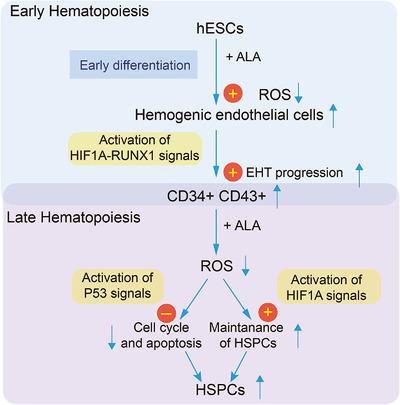当前位置:
X-MOL 学术
›
J. Leukoc. Biol.
›
论文详情
Our official English website, www.x-mol.net, welcomes your
feedback! (Note: you will need to create a separate account there.)
Alpha lipoic acid promotes development of hematopoietic progenitors derived from human embryonic stem cells by antagonizing ROS signals.
Journal of Leukocyte Biology ( IF 3.6 ) Pub Date : 2020-07-08 , DOI: 10.1002/jlb.1a0520-179r Yong Dong 1 , Ju Bai 1 , Yimeng Zhang 1 , Ya Zhou 1 , Xu Pan 1 , Xiaohong Li 1 , Qiongxiu Zhou 1 , Yijin Chen 1 , Mowen Lai 1 , Bin Mao 1 , Guohui Bian 1 , Jia Feng 1 , Fangxin Xie 1 , Bo Chen 1 , Tatsutoshi Nakahata 2 , Yonggang Zhang 1 , Feng Ma 1, 3
Journal of Leukocyte Biology ( IF 3.6 ) Pub Date : 2020-07-08 , DOI: 10.1002/jlb.1a0520-179r Yong Dong 1 , Ju Bai 1 , Yimeng Zhang 1 , Ya Zhou 1 , Xu Pan 1 , Xiaohong Li 1 , Qiongxiu Zhou 1 , Yijin Chen 1 , Mowen Lai 1 , Bin Mao 1 , Guohui Bian 1 , Jia Feng 1 , Fangxin Xie 1 , Bo Chen 1 , Tatsutoshi Nakahata 2 , Yonggang Zhang 1 , Feng Ma 1, 3
Affiliation

|
Antagonism of ROS signaling can inhibit cell apoptosis and autophagy, thus favoring the maintenance and expansion of hematopoietic stem cells. Alpha lipoic acid (ALA), a small antioxidant molecule, affects cell apoptosis by lowering the ROS level. In this study, we show that ALA promoted production of human pluripotent stem cells (hPSCs) derived hemogenic endothelial cells and hematopoietic stem/progenitor cells in vitro. Transcriptome analysis of hPSCs derived hemogenic endothelial cells showed that ALA promoted endothelial‐to‐hematopoietic transition by up‐regulating RUNX1, GFI1, GFI1B, MEIS2, and HIF1A and down‐regulating SOX17, TGFB1, TGFB2, TGFB3, TGFBR1, and TGFBR2. ALA also up‐regulated sensor genes of ROS signals, including HIF1A, FOXO1, FOXO3, ATM, PETEN, SIRT1, and SIRT3, during the process of hPSCs derived hemogenic endothelial cells generation. However, in more mature hPSC‐derived hematopoietic stem/progenitor cells, ALA reduced ROS levels and inhibited apoptosis. In particular, ALA enhanced development of hPSCs derived hematopoietic stem/progenitor cells by up‐regulating HIF1A in response to a hypoxic environment. Furthermore, addition of ALA in ex vivo culture greatly improved the maintenance of functional cord blood HSCs by in vivo transplantation assay. Our findings support the conjecture that ALA plays an important role in efficient regeneration of hematopoietic stem/progenitor cells from hPSCs and maintenance of functional HSCs, providing insight into understanding of regeneration of early hematopoiesis for engineering clinically useful hPSCs derived hematopoietic stem/progenitor cells transplantation. Thus, ALA can be used in the study of hPSCs derived HSCs.
中文翻译:

α-硫辛酸通过拮抗ROS信号来促进源自人类胚胎干细胞的造血祖细胞的发育。
ROS信号的拮抗作用可以抑制细胞凋亡和自噬,从而有利于造血干细胞的维持和扩增。硫辛酸(ALA)是一种小的抗氧化剂分子,可通过降低ROS水平来影响细胞凋亡。在这项研究中,我们表明ALA在体外可促进人多能干细胞(hPSCs)衍生的造血内皮细胞和造血干/祖细胞的产生。对源自hPSCs的造血内皮细胞的转录组分析表明,ALA通过上调RUNX1,GFI1,GFI1B,MEIS2和HIF1A并下调SOX17,TGFB1,TGFB2来促进内皮细胞向造血细胞的转化,TGFB3,TGFBR1和TGFBR2。ROS信号的ALA也上调的传感器基因,包括HIF1A,FOXO1,FOXO3,ATM,碇,SIRT1和SIRT3,在hPSCs产生血液的内皮细胞的过程中。但是,在更成熟的hPSC来源的造血干/祖细胞中,ALA降低了ROS水平并抑制了细胞凋亡。特别是,ALA通过响应缺氧环境而上调HIF1A,从而增强了源自hPSC的造血干/祖细胞的发育。此外,在离体培养中添加ALA可通过体内移植测定极大地改善功能性脐带血HSC的维持。我们的发现支持这样的推测:ALA在从hPSCs高效再生造血干/祖细胞和维持功能性HSC中起着重要作用,为深入了解早期造血的再生提供了见识,以工程化临床上有用的hPSC衍生的造血干/祖细胞移植。
更新日期:2020-07-08
中文翻译:

α-硫辛酸通过拮抗ROS信号来促进源自人类胚胎干细胞的造血祖细胞的发育。
ROS信号的拮抗作用可以抑制细胞凋亡和自噬,从而有利于造血干细胞的维持和扩增。硫辛酸(ALA)是一种小的抗氧化剂分子,可通过降低ROS水平来影响细胞凋亡。在这项研究中,我们表明ALA在体外可促进人多能干细胞(hPSCs)衍生的造血内皮细胞和造血干/祖细胞的产生。对源自hPSCs的造血内皮细胞的转录组分析表明,ALA通过上调RUNX1,GFI1,GFI1B,MEIS2和HIF1A并下调SOX17,TGFB1,TGFB2来促进内皮细胞向造血细胞的转化,TGFB3,TGFBR1和TGFBR2。ROS信号的ALA也上调的传感器基因,包括HIF1A,FOXO1,FOXO3,ATM,碇,SIRT1和SIRT3,在hPSCs产生血液的内皮细胞的过程中。但是,在更成熟的hPSC来源的造血干/祖细胞中,ALA降低了ROS水平并抑制了细胞凋亡。特别是,ALA通过响应缺氧环境而上调HIF1A,从而增强了源自hPSC的造血干/祖细胞的发育。此外,在离体培养中添加ALA可通过体内移植测定极大地改善功能性脐带血HSC的维持。我们的发现支持这样的推测:ALA在从hPSCs高效再生造血干/祖细胞和维持功能性HSC中起着重要作用,为深入了解早期造血的再生提供了见识,以工程化临床上有用的hPSC衍生的造血干/祖细胞移植。











































 京公网安备 11010802027423号
京公网安备 11010802027423号